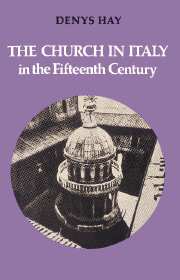Book contents
- Frontmatter
- Contents
- PREFACE
- 1 The problems of Italian church history
- 2 Diocesan and parochial organisation
- 3 The Schism in Italy: the emergence of an Italian papacy
- 4 The state of the clergy and laity in fifteenth-century Italy
- 5 The quality of Italian religious life. Reform
- 6 The Italian Renaissance and the clergy of Italy in the fifteenth century
- APPENDIX
- NOTES
- REFERENCES
- INDEX (NOT INCLUDING APPENDICES)
1 - The problems of Italian church history
Published online by Cambridge University Press: 22 October 2009
- Frontmatter
- Contents
- PREFACE
- 1 The problems of Italian church history
- 2 Diocesan and parochial organisation
- 3 The Schism in Italy: the emergence of an Italian papacy
- 4 The state of the clergy and laity in fifteenth-century Italy
- 5 The quality of Italian religious life. Reform
- 6 The Italian Renaissance and the clergy of Italy in the fifteenth century
- APPENDIX
- NOTES
- REFERENCES
- INDEX (NOT INCLUDING APPENDICES)
Summary
The difficulties facing the historian of the church in Italy are very considerable and deserve preliminary consideration. This must begin by emphasising a paradox. In recent times church history in Italy has often been written at a very low level indeed. Yet Italy had centuries before been a pioneer in such studies.
There is no need to go behind Bartolomeo Sacchi, called from his birth-place Platina, whose History of the Popes is a somewhat neglected work. For the early period of papal history he preserved the legends which were often abstracted in the form he had given them by other writers at the time and for centuries to come. In common with his fellow curialist and contemporary Biondo in the Decades, as Platina drew nearer to his own day (he died in 1481) so his work became increasingly a history not, it is true, of the Italian church as such, but of papal policy in Italy. In many ways Platina resembled the many historians working in the princely courts of quattrocento Italy. He was indeed to commemorate his patrons the Gonzaga with a history of Mantua. But he had an inestimable advantage, to be shared by later historians of the papacy. In his Lives of the Popes he was not writing the history of a dynasty. He was writing the history of an institution of which he was a rather quarrelsome member. This, together with his sharp criticism of some popes and the high level of his accuracy, ensured respect for him among other writers, including Protestants in the post-Reformation period. In the mid-sixteenth century he was edited and continued by Panvinio.
- Type
- Chapter
- Information
- The Church in Italy in the Fifteenth CenturyThe Birkbeck Lectures 1971, pp. 1 - 8Publisher: Cambridge University PressPrint publication year: 1977



